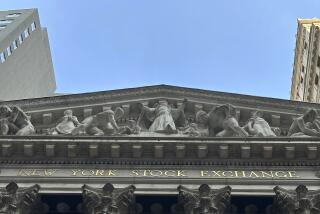Facebook shares fall 11% as investors question revenue prospects
- Share via
Maybe what Facebook really needs is a “buy” button.
After a lifeless opening last week, Facebook shares tumbled on their second day of trading, losing about $10 billion in market value Monday as investors questioned the company’s revenue prospects.
Shares of the Menlo Park, Calif., social network fell to as low as $33 before closing down $4.20, or 11%, to $34.03. It was unclear if Facebook shares got help from traders at the company’s lead underwriter, Morgan Stanley, who stepped in Friday to prop up shares just a hair above their $38 offering price.
It was a stunning setback for Facebook, whose IPO was hotly anticipated for months — and it could slow the pipeline of Web companies, including Twitter, that many expected to come to market in coming months. Facebook will now be under heavy pressure to show that it can make more money from its more than 900 million users, whether they are accessing Facebook on the Web or on mobile phones.
“I guess that the 800-pound gorilla has gone on a diet,” said Scott Sweet, senior managing partner of research firm IPO Boutique, who bought Facebook shares at $38 and sold them for $42 on Friday before the shares closed at $38.23.
Monday’s sell-off renewed questions about Facebook’s lofty-$93 billion market capitalization. Facebook is trading at 59 times projected earnings for the next 12 months versus Google at 14.
But critics blamed banks that advised Facebook on the IPO, saying it was too highly priced. Facebook added to the number of shares and raised the price just ahead of the IPO.
Michael Pachter, a Wedbush Securities analyst who has an “outperform” rating on the stock and a $44 price target, said the banks overestimated demand.
“Adding 84 million shares to the offering suggested to all of us that demand was really high. That turned out not to be the case,” Pachter said. “This has zero to do with what the company is worth and everything to do with the supply of shares. You are asking every investor to take a leap of faith that they will make money at some point in the future. There is not $18 billion worth of investors willing to take that leap. There may be $5 billion, there may be $10 billion, but not $18 billion.”
Facebook and Morgan Stanley declined to comment.
Facebook raised about $16 billion, making it one of the largest U.S. IPOs. But it didn’t realize a first-day pop of 10% to 15%, a gain that is supposed to balance the risk for investors taking a flier on a new stock.
Analysts say investors are wary of Facebook’s sky-scraping valuation with so little certainty about its prospects.
General Motors said last week it was pulling display ads on Facebook, raising questions about the effectiveness of advertising on the site. Sales at Facebook, which makes most of its money from online ads, were $3.7 billion last year. Google, with a value almost twice that of Facebook, had nearly $38 billion in revenue last year. It jumped 18% on its first day of trading in 2004. Facebook, the biggest provider of online display ads in the U.S., may lose that perch to Google next year, according to research firm EMarketer.
Brian Wieser, a Pivotal Research Group analyst, was the first to come out with a “sell” rating on Facebook. His price target is $30, which he said accounts for the risks of investing in Facebook.
“At $34, it’s still too robust a value to compensate for the risks,” Wieser said. “There is still room to go to get to a fair fundamental valuation.”
Michael Yoshikami, chief executive of Destination Wealth Management, also pegged Facebook’s value at $30 a share.
“The stock is down because the valuation was simply too high without a clear plan to accelerate advertising revenue,” Yoshikami said. “I’m sure many are surprised that euphoria didn’t irrationally kick up shares, but perhaps investors have learned the lessons from the dot-com crash. Valuations must make sense even for an iconic Web brand.”
Facebook’s first day of trading on Nasdaq suffered delays and glitches, so much so that Nasdaq had to change its IPO procedures. A Nasdaq spokesman declined to comment.
Analysts say the trading hiccups had little effect on Facebook’s debut. Facebook is just too rich for most investors, they said.
“Overall, we are very excited about the long-term growth potential of Facebook. When you look out at the course of the next five years, there is a huge market opportunity to improve the targeting of advertising on a global basis,” BTIG analyst Richard Greenfield said. “But Facebook from an advertising standpoint is in its infancy in terms of brand and content companies knowing how to use it. The stock at $38 is not compelling when you look out at the next 12 months. We are not recommending buying at these levels.”
Pachter is standing by his price target of $44. He called Facebook at $34 a share “a screaming bargain.”
“Anyone who buys here is going to make money,” he said.
More to Read
Inside the business of entertainment
The Wide Shot brings you news, analysis and insights on everything from streaming wars to production — and what it all means for the future.
You may occasionally receive promotional content from the Los Angeles Times.










